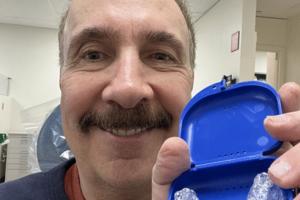Health
/ArcaMax

Dinosaurs and Christmas go together in one home's lights display
LEXINGTON, S.C. -- Most people may not associate the holiday season with dinosaurs, but that’s the vibe at the Price household.
The yard of the house on Augusta Road/Highway 1 just outside Lexington is crawling with dinos of various sizes. The creatures made out of insulation foam board frolic amid the twinkle of the Christmas lights on the ...Read more

Jerry Zezima: Tooth or consequences
My orthodontist is a gem. That’s why he suggested I buy an ultrasonic retainer cleaner that my wife can wash her jewelry in.
I got retainers several years ago when I decided to go straight, not because I was a crooked jewel thief, but because two of my teeth were crooked and needed straightening.
I went to the Stony Brook University School ...Read more

The Kid Whisperer: How to get kids to become responsible for bringing their things to school
Dear Kid Whisperer,
My 13-year-old daughter, like many of her friends, carries a water bottle around with her all day at school. Since the beginning of the last school year, she’s been forgetting it, and this year, she’s been forgetting it much more -- usually twice per week. I bring it to her because I don’t want her to become dehydrated...Read more

Gustavo Arellano: Citrus in December is a SoCal tradition. Enjoy your harvest while you can
LOS ANGELES — Every December in Southern California, the days get shorter yet brighter — and it's not Christmas lights or the shifting sun that make the region shine.
I'm talking about citrus.
Trees heavy with fruits that ripen through the color spectrum as winter progresses are as much a Southern California holiday tradition as tamales ...Read more

Steve Lopez: 'I can't deal with life sober': Response to the MacArthur Park drug epidemic just isn't enough
LOS ANGELES — He was bent at the waist, wobbly and shoeless on grimy pavement at the end of an alley where fires smolder, drug users gather day and night, and death lurks.
Slowly, he made his way across the parking lot behind the Yoshinoya restaurant at Wilshire Boulevard and Alvarado Street. It was not a normal gait, but in MacArthur Park, ...Read more

Heidi Stevens: Holiday pajamas and police escorts: The infuriating contrast at Abundant Life Christian School
The kids were in holiday jammies.
They were being escorted out of their school, which just became a crime scene, and they were dressed in flannel pants and plaid robes and furry slippers. One boy’s shirt said DON’T MOOSE AROUND above a plaid moose, which matched his red and black plaid pajama bottoms.
The adults were decked out too. One ...Read more

Debra-Lynn B. Hook: Mammas in our kerchiefs getting Christmas 'right'
As we round the corner to Christmas, I feel compelled to say something to women across the land:
It’s OK.
It’s OK that you didn’t get the same amount of presents for each child.
It’s OK that you shopped for yourself. Not once or twice, but often.
It’s OK that you didn’t meet your Christmas budget while negotiating a trillion-...Read more

A low-down town in the California desert loves its flagpole -- formerly the world's tallest
CALIPATRIA, Calif. — The little desert town of Calipatria, known for its state prison, is a humble place.
It struggles with poverty. It's in the middle of Imperial County, where the 20% unemployment rate is California's highest. And some days, its dusty air carries the stench of the polluted Salton Sea eight miles west.
But if you call ...Read more

No holiday plans? This social app will match you with a group of strangers for dinner
LOS ANGELES -- When David Brown moved from Chicago to Los Angeles this summer, one of the first things he did was download an app that aims to "fight big-city loneliness."
The 35-year-old sales director had seen an Instagram ad for Timeleft, which matches users with strangers for dinner via a personality algorithm. Since he only knew a handful ...Read more

15 part-time jobs for retirees
By 2033, about 30% of Americans ages 65 to 74 are expected to still be in the labor force, while 10% of people ages 75 and older are expected to still be working, according to projections by the U.S. Bureau of Labor Statistics.
A study by the Transamerica Center for Retirement Studies found that 57% of workers across all generations plan to ...Read more

A St. Louis troop's breakup with Girl Scouts leads to national launch of Salam Scouts
ST. LOUIS -- Kids ran across the dark field behind the mosque toward a pile of trash. They had to quickly decide if an egg carton belonged in the recycle, compost or trash bin. Then, each one ran back to the kids waiting to continue the relay race.
“We need to go one at a time,” Nawal Abuhamdeh called out over the noisy din of about 40 ...Read more

On Gardening: Art & Sol mangave coming this spring
Six-months ago I wrote a column introducing you to the Art & Sol collection of mangaves, which was having a soft release with a full debut occurring in 2025. If you are not familiar with mangave, it is a cross between the agave and a plant called the manfreda, both native to the Southwest.
The taxonomic hierarchy has recently determined that ...Read more

Ask Anna: Help! My boyfriend's gift game is weak -- here's how to talk about it
Dear Anna,
When it comes to gifts, my boyfriend of two years kinda phones it in. For my birthday last month, he gave me a gift card to a coffee shop, which was sweet, but I work from home and don’t even drink that much coffee! Last Christmas, I got a generic piece of jewelry that wasn’t my style at all. I’ve tried to tell myself it’s ...Read more

Why are these people waiting two hours for lutefisk?
MINNEAPOLIS -- For a certain cohort of Minnesotans, Christmas isn’t Christmas without Swedish meatballs, Swedish sausage, herring, lutefisk and lefse. And in Minneapolis, the place to shop for these things is Ingebretsen’s, an East Lake Street stronghold of Scandinavian culture since 1921.
As Dec. 25 approaches, the queue for the meat ...Read more

Ex-etiquette: What's your motivation for giving a gift?
Q. I don’t hate my ex, and I’d like to get him a little something for Christmas. What’s good ex-etiquette?
A. I have multiple answers to your question. Do you have children or not? Using the children as qualifiers, that will help determine my answer.
If you don’t have children, how will the present be received, and what is the ...Read more

Erika Ettin: How much should I tell my friends about my love life?
It’s 11 p.m. on Tuesday, and you’re wrapping up a first date. And it was a pretty good one! It ends with a hug goodbye and tentative plans to get together again for dinner early next week (you know, if you ever hear from him again). As you climb into your Lyft and give a final wave to your date, you’re excited that after a string of "mid" ...Read more

Ex-etiquette: Her kids not welcome at the holidays?!!
Q. My son recently married a woman with four children. They also have a baby together, my only grandchild. We are expecting a lot of company for the upcoming holiday, and I have asked my son to bring my grandchild but leave his wife’s children at home. There’s just not enough room. Now he’s refusing to come, and I’m broken-hearted. What ...Read more

Restaurant rolls out automated kitchen in Chicago, where robots make the salads
CHICAGO -- Diners at Sweetgreen in Willis Tower, get ready to meet the chef of the future: a robot that makes your salad to order.
The California-based chain is launching its automated Infinite Kitchen system this week at the busy Loop restaurant, putting an assembly line of robotic chefs to work preparing bowls of everything from Kale Caesar ...Read more

'You can't let it be lost': Residents revive Christmas service in long-shuttered church
PAYNESVILLE, Minn. – The red wooden doors at Salem Historical Church have been tightly sealed and locked for most of the last half-century.
But on Saturday night, the doors were a portal to the past: Inside were twinkling holiday lights and a pine tree that stretched to the ceiling, its boughs draped in silver tinsel. A sugary aroma hung ...Read more

The Kid Whisperer: How to guide kids to respectfully set limits with teachers
Dear Kid Whisperer,
My freshman son is well-behaved and loves school, except for fifth period. That class is taught by a long-term substitute and has been all year. My son has been a pretty accurate reporter so far in his life at school, and he says that the substitute does not have lesson plans and student behaviors are pretty bad. The ...Read more
Popular Stories
- Is it taboo to regift holiday gifts? 1 in 3 Americans say no
- Heidi Stevens: Holiday pajamas and police escorts: The infuriating contrast at Abundant Life Christian School
- On Gardening: Art & Sol mangave coming this spring
- A low-down town in the California desert loves its flagpole -- formerly the world's tallest
- With one last hymn, parishioners bid farewell to 150-year-old church in small Minnesota town






















